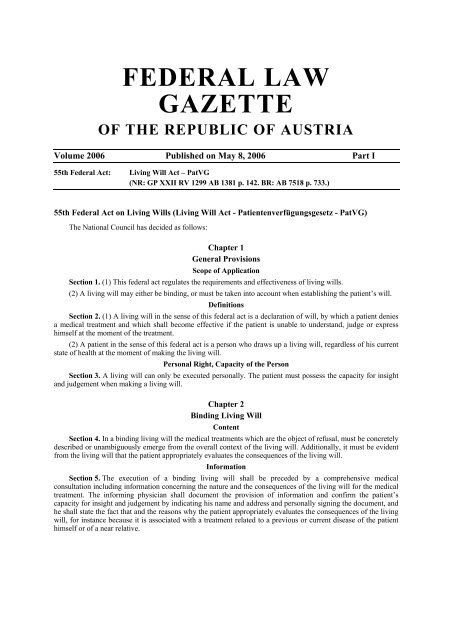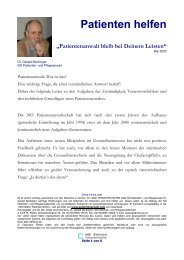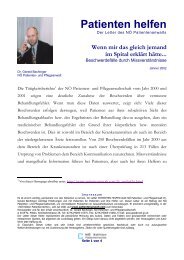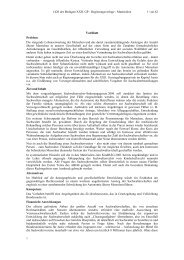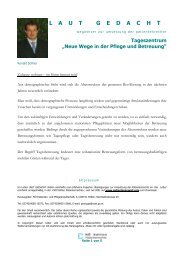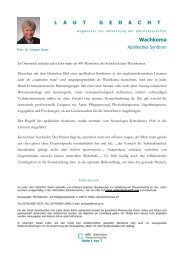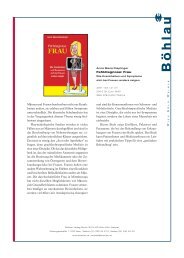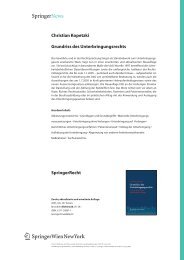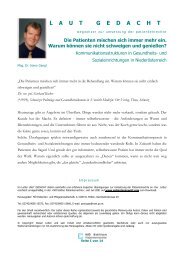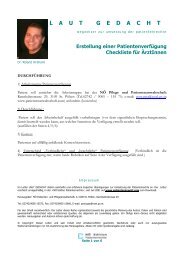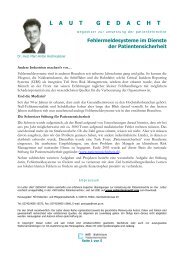FEDERAL LAW GAZETTE OF THE REPUBLIC OF AUSTRIA ...
FEDERAL LAW GAZETTE OF THE REPUBLIC OF AUSTRIA ...
FEDERAL LAW GAZETTE OF THE REPUBLIC OF AUSTRIA ...
Create successful ePaper yourself
Turn your PDF publications into a flip-book with our unique Google optimized e-Paper software.
<strong>FEDERAL</strong> <strong>LAW</strong><br />
<strong>GAZETTE</strong><br />
<strong>OF</strong> <strong>THE</strong> <strong>REPUBLIC</strong> <strong>OF</strong> <strong>AUSTRIA</strong><br />
Volume 2006 Published on May 8, 2006 Part I<br />
55th Federal Act:<br />
Living Will Act – PatVG<br />
(NR: GP XXII RV 1299 AB 1381 p. 142. BR: AB 7518 p. 733.)<br />
55th Federal Act on Living Wills (Living Will Act - Patientenverfügungsgesetz - PatVG)<br />
The National Council has decided as follows:<br />
Chapter 1<br />
General Provisions<br />
Scope of Application<br />
Section 1. (1) This federal act regulates the requirements and effectiveness of living wills.<br />
(2) A living will may either be binding, or must be taken into account when establishing the patient’s will.<br />
Definitions<br />
Section 2. (1) A living will in the sense of this federal act is a declaration of will, by which a patient denies<br />
a medical treatment and which shall become effective if the patient is unable to understand, judge or express<br />
himself at the moment of the treatment.<br />
(2) A patient in the sense of this federal act is a person who draws up a living will, regardless of his current<br />
state of health at the moment of making the living will.<br />
Personal Right, Capacity of the Person<br />
Section 3. A living will can only be executed personally. The patient must possess the capacity for insight<br />
and judgement when making a living will.<br />
Chapter 2<br />
Binding Living Will<br />
Content<br />
Section 4. In a binding living will the medical treatments which are the object of refusal, must be concretely<br />
described or unambiguously emerge from the overall context of the living will. Additionally, it must be evident<br />
from the living will that the patient appropriately evaluates the consequences of the living will.<br />
Information<br />
Section 5. The execution of a binding living will shall be preceded by a comprehensive medical<br />
consultation including information concerning the nature and the consequences of the living will for the medical<br />
treatment. The informing physician shall document the provision of information and confirm the patient’s<br />
capacity for insight and judgement by indicating his name and address and personally signing the document, and<br />
he shall state the fact that and the reasons why the patient appropriately evaluates the consequences of the living<br />
will, for instance because it is associated with a treatment related to a previous or current disease of the patient<br />
himself or of a near relative.
Executing a Living Will<br />
Section 6. (1) A living will is binding, if it has been drafted in writing and by indicating the date in the<br />
presence of an attorney, a notary or a legally trained associate of the patient advocacies, (Section 11e Hospital<br />
and Health Institutions Act, Federal Law Gazette No. 1/1957), and if the patient has been informed concerning<br />
the consequences of the living will as well as about the possibility of revocation at any time.<br />
(2) The attorney, the notary or the legally trained associate of the patient advocacies shall document the<br />
provision of this instruction in the living will by indicating his name and address and personally signing the<br />
document.<br />
Renewal<br />
Section 7. (1) A living will loses its binding character after the expiration of five years from its execution,<br />
unless the patient has defined a shorter expiry date. It can be renewed after appropriate medical information in<br />
compliance with the formal requirements mentioned in section 6; therewith, a new period of five years has<br />
begun.<br />
(2) Any supplementary amendment of the contents of the living will shall be considered as a renewal.<br />
Thereby, the provisions concerning the execution of a binding living shall be applied accordingly. With each<br />
supplementary amendment the expiry date mentioned in paragraph 1 is reset for the entire living will.<br />
(3) A living will shall not lose its binding character as long as the patient is not able to renew it because of<br />
an incapacity to understand, judge or express himself/herself.<br />
Chapter 3<br />
Non-Binding Living Will<br />
Conditions<br />
Section 8. A living will which does not fulfil all conditions mentioned in sections 4 to 7, must nevertheless<br />
be taken into account for the establishment of the patient’s will.<br />
Consideration of a Living Will<br />
Section 9. The more a non-binding living will fulfils the requirements of a binding living will, the more it<br />
shall be taken into account for the establishment of the patient’s will. Thereby, it shall be considered in particular<br />
to what extent the patient was able to evaluate the disease situation, which the living will is related to, as well as<br />
the consequences of it at the time of drawing up the living will, how concretely the medical treatments which are<br />
the object of refusal, are described, how comprehensive the medical information prior to the execution was, to<br />
what extent the living will deviates from the formal requirements of a binding living will, how often the living<br />
will was renewed and how far back the most recent renewal dates.<br />
Chapter 4<br />
Common Provisions<br />
Ineffectviveness<br />
Section 10. (1) A living will is invalid, if<br />
1. it is not based on a free and well-considered declaration, or if it has been initiated by error, fraud,<br />
deception or on physical or mental pressure,<br />
2. its content is legally unacceptable<br />
3. the status of the medical science regarding the content of the living will has essentially changed since it<br />
has been drawn up.<br />
(2) A living will loses its validity, if the patient revokes it himself or suggests that it is no longer valid.<br />
Other Contents<br />
Section 11. It is not contrary to the validity of a living will that it includes additional comments of the<br />
patient, particularly the designation of a concrete confidant, the refusal of contact to a specific person or the<br />
obligation to inform a specific person.
Emergencies<br />
Section 12. Medical emergency treatment shall remain unaffected by this federal act, if the time spent to<br />
search a living will seriously endangers the patient’s life or health.<br />
Obligations of the Patient<br />
Section 13. A living will shall not enable the patient to restrict his obligations of undergoing a treatment,<br />
imposed on him by specific legal provisions.<br />
Documentation<br />
Section 14. (1) The informing and the attending physician shall include living wills in the clinical records<br />
or, if they are drawn up outside a hospital, in the medical history.<br />
(2) If in the course of providing information pursuant to section 5 a physician observes, that the patient does<br />
not possess the capacity for insight and judgement required for the execution of a living will, he shall document<br />
this, if applicable, within the scope of the medical history.<br />
Administrative Penalties for Protection against Misuse<br />
§ 15. Any person who makes the access to treatment, nursing or caregiving institutions, or the receipt of<br />
such services dependent on the fact that a living will has been executed or not, commits an administrative<br />
offence, as far as this action is not threatened with a court-imposed penalty, and shall be liable to punishment by<br />
a fine of up to 25 000 Euros, in case of recurrence of up to 50 000 Euros.<br />
Chapter 5<br />
Final Provisions<br />
Person-related terms<br />
Section 16. In all terms related to patients the chosen form shall apply to both genders equally.<br />
References<br />
Section 17. Insofar as reference is made in this federal act to other federal acts, these shall be applied in the<br />
current version in force.<br />
Entry into Force<br />
Section 18. This federal act shall enter into force on the first of the month following the month of its<br />
publication. Living wills already executed at this time, shall be evaluated for their effectiveness according to this<br />
federal act.<br />
Enforcement<br />
Section 19. The Minister for Health and Women in agreement with the Minister of Justice shall be<br />
entrusted with the enforcement of this federal act.<br />
Fischer<br />
Schüssel


